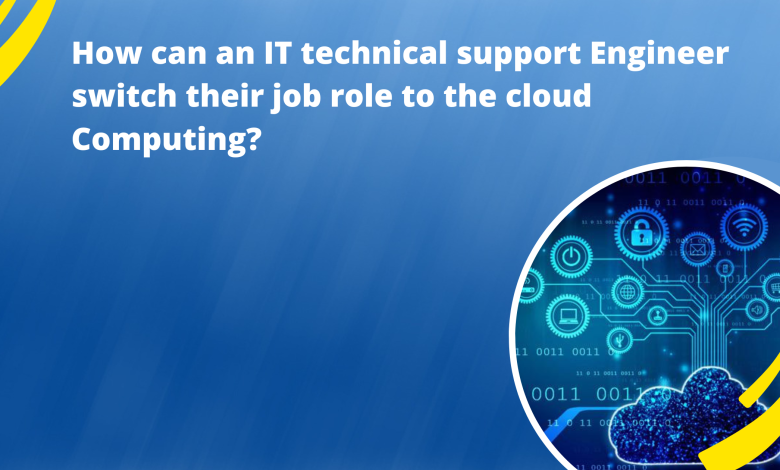How can an IT technical support Engineer switch their job role to the cloud?

How can an IT technical support Engineer switch their job role to the cloud Computing?
Recently there is a great deal of interest from those with traditional IT technical support Engineers and networking engineers—to switch themselves into a cloud computing career that will not only provide job protection but provide better pay as well.
Working as an IT technical support Engineer should give basic networking and Linux/Windows admin experience. So learning cloud computing will not be a challenging task for them. Learning cloud technology can be quick and easy and can take as little as a few days up to a few months. But, the exact time it’ll take you to learn AWS depends on your interest and mode of study.
Ipsr solutions limited is providing cloud and devops engineering courses. This course from IPSR can help you acquire the skills and knowledge needed to take on highly coveted jobs in the DevOps domain. You will get hands-on experience in working with various DevOps tools from the industry experts
How to Transition into Cloud Computing
To switch from one job role to another, you need to gain the skill requisites required for that new job. By being a cloud Certified Solution Architect – Associate, they should have the skills to evaluate the requirements of the organization and make architectural recommendations for implementation and deployment of the application on AWS.
If you’ve decided on a transition into a cloud computing career for your future, you might be wondering how to make the move. Your first step is deciding on the job role. Spend some time on the job portals like Indeed.com and Glassdoor.com, and the requirements they list. You’ll also have some previous IT experience that you can build on because you won’t want to start from scratch, so that experience might determine your cloud path.
Next, you might want to choose a cloud vendor to focus on, such as Amazon Web Services (AWS) or Azure or you might decide on multi-cloud solutions which are also gaining popularity nowadays.
After you choose a direction and determine the skills and requirements for getting qualified for that job. Getting training from experienced professionals and hands-on training in this field can easily help you to achieve a cloud computing career.
Getting Cloud Certified
Cloud Certification is the easiest way to start your cloud computing career, Different types of certifications are available based on your previous knowledge and career aspirations. Certification in both AWS and the Microsoft azure professional certification can get you started, as you learn the fundamentals of these popular vendors and cloud providers.
IPSR is providing Cloud and DevOps training for the aspirants. IPSR is one of the leading Red Hat training partners with 22 years of experience in providing training and internship programs for the students in the IT field. Both AWS online training and Microsoft Azure professional certification courses are provided.
System administrators: the path to the cloud
System admins need to switch more into the cloud. If they don’t make a move now, they could likely be out of a job in the near future. Sysadmin job roles and responsibilities are changing because the systems that reside in data centres are switching into public clouds, and public cloud systems don’t need as much TLC as on-premises systems do.
For a sysadmin, the cloud career map means switching completely into cloud operations, known as cloudops. This is a new job role in cloud operations, and the responsibilities include backup, recovery, performance monitoring, SLA management, and all the things that come along with operating sets of cloud-based virtual servers that are not physically available
Networking engineer: the path to the cloud
Networking professionals are also difficult to map to cloud technology. Although networking is still needed in intercompany rather than intracompany. That means a transition is happening more toward WANs (wide area networking) and mobile networking.
The truth is that networking technology already exists in the cloud world. In the past when networks went down it was the duty of networking professionals to reboot and update routers and hubs. The key responsibility of a network engineer in the cloud is to design, optimize, and manage. The best switching to the cloud for networking pros is to focus on cloud-based networking. AWS provides DNS services, along with monitoring network traffic in and out. Network engineers who can switch into such services from the enterprise, and provide monitoring and resiliency best practices and use of tools, will have the best career path.




